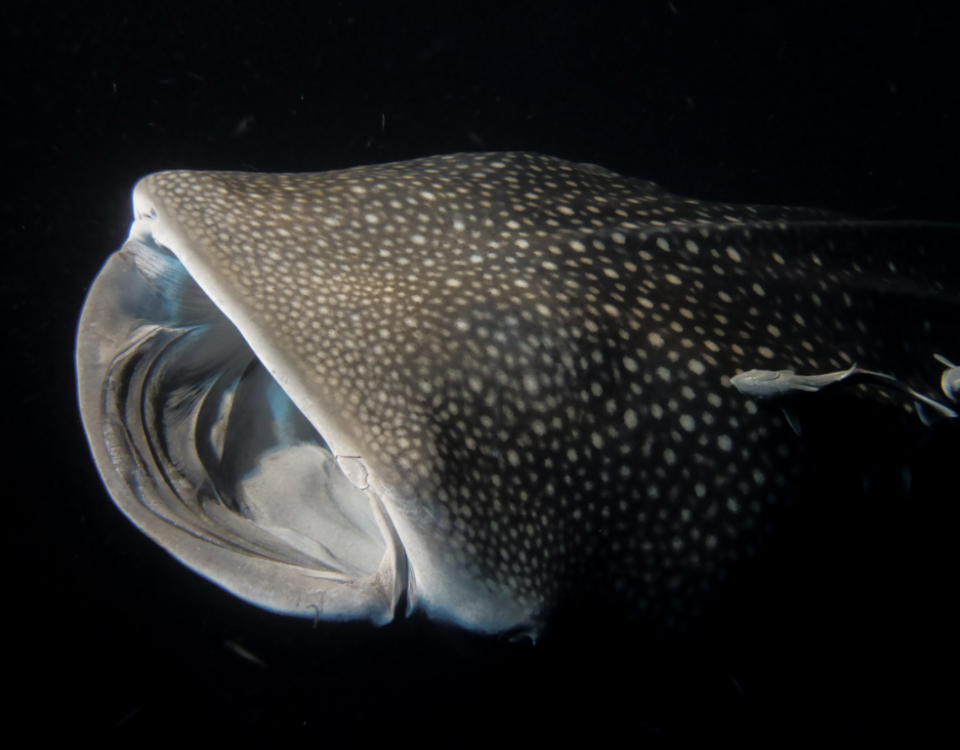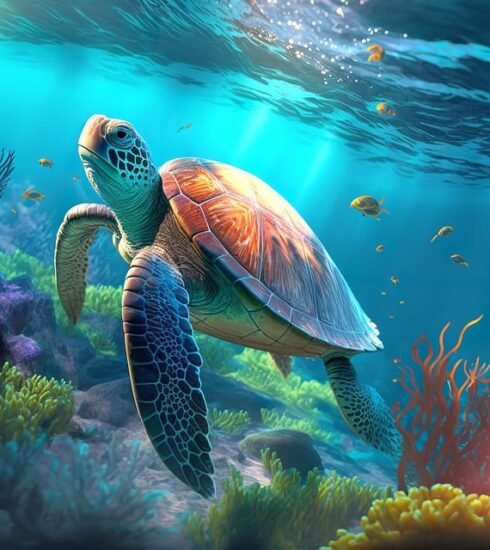India’s Big Friendly Giants: Chronicles Of A Massive Conservation Win
Meet the Ocean’s Gentle Goliaths: Whale Sharks
In the vast blue tapestry of the Indian Ocean, there glides a gentle, spotted behemoth—the whale shark. These oceanic titans, often referred to as the ‘gentle giants’ of the sea, are the largest known fish species alive. With their colossal size, you might think they’d be fearsome predators, but whale sharks are filter feeders, gracefully dining on plankton and small fish. These gentle Goliaths can grow up to 40 feet long, which is about the length of a school bus, but they’re as harmless as a butterfly. Their nomadic lifestyle takes them across the oceans, often cruising through warm waters, including the bountiful coasts of India.
Despite their size and friendly nature, whale sharks are not invulnerable. The International Union for Conservation of Nature (IUCN) has sadly listed them as endangered. Threats like fishing, bycatch, and habitat destruction have dwindled their numbers, causing alarm among conservationists worldwide. The global market for shark fins is a staggering multi-million-dollar industry, with fins from as many as 73 million sharks ending up in the soup each year. Whale sharks, with their massive fins, are particularly valuable. It’s estimated that hundreds, if not thousands, of them have been hunted commercially. Bycatch, the accidental capture of non-target species, also snags a significant number of whale sharks, both globally and in India. Before conservation efforts began, it was reported that about 600 whale sharks were being slaughtered annually in Gujarat alone. Big Yikes, right?
But not all hope is lost! Let’s dive into a tale of triumph, where global initiatives have turned the tide for these gentle giants.

Gigantic Conservation Efforts for our Spotted Sea Giants
Globally, countries have rallied to protect whale sharks through research and community collaborations. Places like the Philippines, where whale shark tourism has become a sustainable alternative to fishing, show us how economic benefits can align with conservation. In Western Australia, the Ningaloo Reef is not only a haven for these creatures but also a hub for scientific study, contributing invaluable knowledge to safeguard their future.
Now, let’s set our course to India, where the Arabian Sea whispers stories of the whale sharks that grace its waters. These magnificent creatures have been visiting the coasts of Gujarat for ages, but they’ve faced threats from accidental catches and targeted hunting for their meat, fins, and oil. The situation was grim, with whale sharks being slaughtered in large numbers, their gentle nature making them easy targets.
The Film That Sparked a Movement
Enter the year 1998, a pivotal moment in India’s conservation history. Mike Pandey, a filmmaker with a vision, released “Shores of Silence,” a documentary that unveiled the plight of whale sharks along the Indian coast. The film’s haunting images and poignant narrative struck a chord with the public and policymakers alike, igniting a movement that would change the fate of these sea giants. (https://youtu.be/TVMW_6_dVhE?si=I68Hti8z1nqFacda)
This film did for whale sharks what Jaws did for great whites, but with a conservation twist. It spotlighted the grim reality of whale shark hunting in India and created such a stir that it set the stage for one of the biggest conservation wins in the country.

A Splashy Coalition for Change
The tides of change began to swell as various initiatives were set in motion to protect the whale sharks. The Ministry of Environment and Forests (MoEF), the Gujarat Forest Department, NGOs like the Wildlife Trust of India, corporate entities like Tata Chemicals Ltd. and most importantly, the fisher and local communities, all joined forces. The conservation efforts were even blessed by spiritual leaders like Morari Bapu, (https://chitrakutdhamtalgajarda.org/) who advocated for the whale sharks’ protection, weaving the value of coexistence into the cultural fabric.
The collaboration bore fruit, and in 2001, the whale shark was granted legal protection, making it the first fish to be listed in Schedule I of the Indian Wildlife (Protection) Act, 1972. (https://forests.gujarat.gov.in/whale-shark-conservation.htm#:~:text=The%20Indian%20Government’s%20Ministry%20of,be%20protected%20by%20Indian%20Law.)
The Gujarat coast became a sanctuary for these oceanic wanderers, and a unique campaign titled “Save the Whale Shark” was launched. The campaign was a masterstroke, combining science backed research, awareness drives, community engagement, and CSR with financial incentives for the release of accidentally caught whale sharks. (https://sustainability.tatachemicals.com/community-and-biodiversity/programmes/india/save-the-whale-shark-project/)
The success story of India’s whale sharks is like a Bollywood blockbuster, complete with an all-star cast. Policymakers, enforcers, conservationists, and a business all teamed up with local communities to turn the tide for these giants.

The Big Win for India’s Whale Sharks
So, how did this conservation story become a blockbuster hit in India? By blending science, community based conservation, and a dash of celebrity endorsement, India crafted a whale shark conservation model that’s been a roaring success. The latest developments include ongoing research projects that track these giants using satellite tags, giving us the deets on their secret lives.
The story of India’s whale sharks is a testament to the power of collective action. Fishermen, once hunters, became guardians, often rescuing entangled whale sharks and setting them free. The Gujarat model of conservation has been hailed as a beacon of hope, showing the world that when government agencies, NGOs, corporations, and communities come together, conservation is not just a possibility but a resounding success.
Fast forward to the present day, and the whale shark conservation efforts and their populations are still going strong. Research is thriving, with satellite tagging programs and genetic studies shedding light on the migratory patterns and breeding behaviors of these elusive creatures. The annual Whale Shark Day celebration keeps the momentum going, reminding us of the journey we’ve taken and the path that lies ahead. (https://indianexpress.com/article/cities/ahmedabad/off-veraval-coast-27-feet-long-whale-shark-satellite-tagged-9242509/#)
Why Saving Whale Sharks Makes Waves
Conserving whale sharks isn’t just about saving a single species; it’s about keeping our oceans healthy and our ecosystems balanced. Plus, it turns out that whale sharks are worth more swimming free than in a bowl of soup. Communities around the world have benefited from eco-tourism, with whale shark sightings becoming a big draw for tourists.

Speaking of tourism, if you’re itching to swim with these spotted beauties, there are a few hotspots you should check out. The Ningaloo Reef in Australia, the Philippines’ Donsol, and the Galápagos Islands are just a few places where you can don your snorkel and mingle with the fishy celebs of the sea. Take it from someone who’s done it when I say the experience is absolute fire! Remember the ‘once in a lifetime’ category of travel– well, here’s something that fits right in (https://www.whalesharktours.com.au/)
The Fin-tastic Conclusion
This chronicle of conservation is a story of transformation, from exploitation to protection, from ignorance to awareness. It’s a narrative that resonates with the power of empathy and the indomitable spirit of collaboration. India’s big friendly giants have become symbols of hope, showing us that even the most massive of challenges can be overcome when we swim together.
As we navigate the currents of conservation, let’s remember the whale sharks of India and the sea of change that brought them from the brink of despair to the shores of hope. On International Shark Awareness Day on 14th July, let’s use this day not only to celebrate these magnificent creatures but also to amplify our efforts in safeguarding them. With ongoing research and unwavering commitment, the future looks bright for these gentle giants of the Indian Ocean. When we continue to champion their cause, we ensure that their silent song continues to echo through the ocean depths for generations to come.
In this story of how a community based conservation initiative, lies a testament to corporate responsibility and environmental stewardship. Tata Chemicals Ltd, with its sprawling chemical plant near Dwarka, has embraced the whale sharks that share its territory, not merely as neighbors but as partners in prosperity. This is a shining example of a Corporate Social Responsibility (CSR) project done right. By investing in the preservation of whale sharks, Tata Chemicals has demonstrated how corporations can play a pivotal role in species conservation while simultaneously boosting local economies.
This initiative serves as a beacon of inspiration for other businesses, both large and small, to test the waters of sustainable development. Corporations that align their operations with the well-being of their natural surroundings find that they do not just protect the environment but also cultivate goodwill and a positive brand image. It’s a win-win scenario where the survival of a species sparks a ripple effect, leading to thriving communities and sustainable business practices.
India’s whale shark saga is a tale of triumph, a narrative that proves when humans and nature collaborate, the results can be spectacular. From being hunted to being honored, whale sharks in India have swum a long way. And with continued efforts, we can ensure that these big friendly giants keep gracing our oceans with their majestic presence. So, let’s keep creating ripples in conservation and give these whale sharks the happily ever after they deserve! 🌊☀️







1 Comment
Newsletter December 2024 - Green Pistachio
6 months ago[…] Whale Shark Conservation in India: Did you know that the gentle giants of the sea, whale sharks, are under threat? We explored how […]